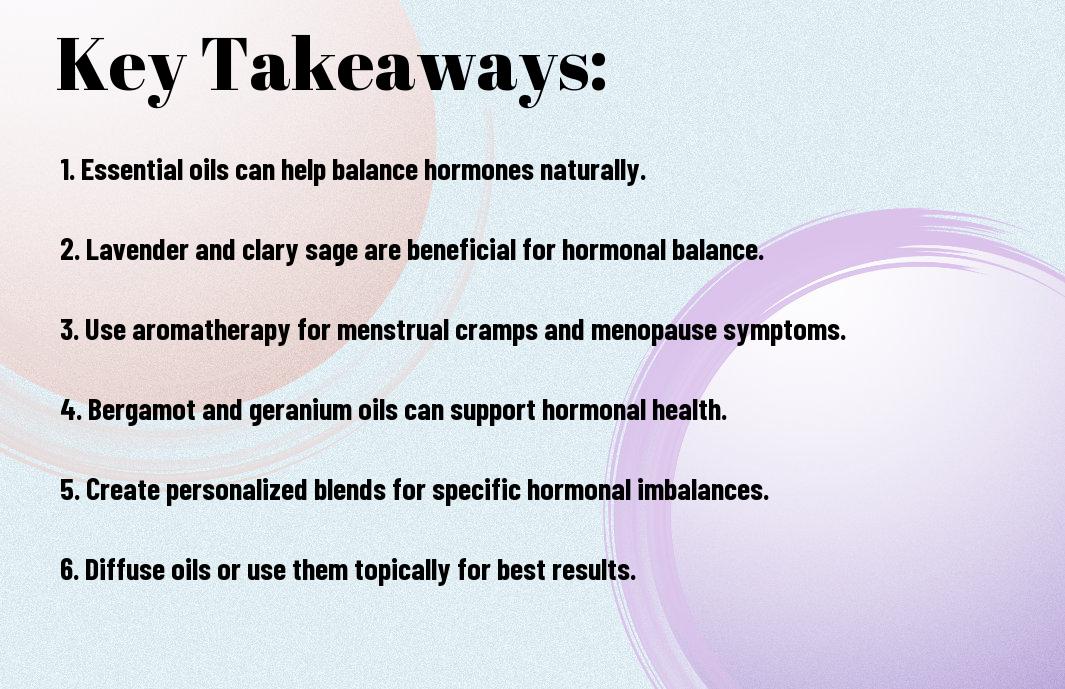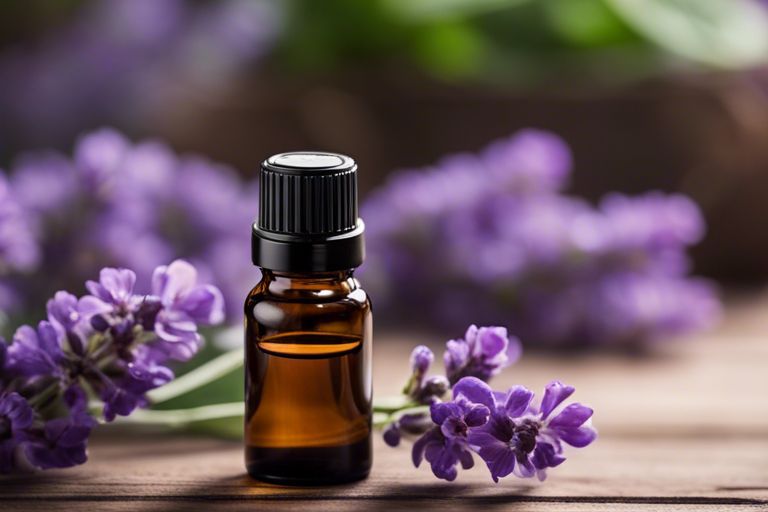Just as your body strives for balance in all aspects, your hormones also play a crucial role in your well-being. In this blog post, you will uncover aromatherapy secrets that can help you achieve hormonal balance naturally. By harnessing the power of important oils and their therapeutic properties, you can support your hormones and promote harmony within your body. Discover how these ancient remedies can transform your health and enhance your overall wellness.
Key Takeaways:
- Aromatherapy: Essential oils have the power to balance hormones and promote well-being.
- Clary Sage and Lavender: These vital oils are particularly effective in regulating hormones and reducing stress.
- Mind-Body Connection: Aromatherapy can help create harmony between the body, mind, and emotions for overall hormonal balance.
The Connection Between Aromatherapy and Hormones
Before we probe how aromatherapy can help balance your hormones, it’s vital to understand the science behind how vital oils interact with your body.
How Essential Oils Affect Hormone Regulation
Aromatherapy works by stimulating your limbic system, which is the part of your brain that plays a significant role in controlling emotions, behavior, and long-term memory. When you inhale or apply vital oils topically, the compounds in the oils can directly affect this system, leading to a cascade of reactions in your body.
The Science Behind Aromatherapy and Hormonal Balance
Connection. Did you know that certain vital oils can mimic the effects of hormones in your body? This mimicry can help regulate hormonal imbalances and promote overall wellbeing. Some oils, such as clary sage and geranium, have estrogen-like properties that can be beneficial for women going through menopause or experiencing menstrual irregularities.
Common Hormonal Imbalances and Their Causes
It is necessary to understand the common hormonal imbalances and their causes to effectively address them. Several factors can contribute to hormonal disruptions, leading to various health issues. Let’s investigate into some of the most prevalent imbalances that can affect your well-being.
Thyroid Issues: Hypothyroidism and Hyperthyroidism
Any imbalance in your thyroid hormones can wreak havoc on your body’s delicate equilibrium. Hypothyroidism, where the thyroid gland is underactive, can cause symptoms like fatigue, weight gain, and depression. On the other hand, hyperthyroidism, an overactive thyroid, can result in anxiety, weight loss, and heart palpitations.
Adrenal Fatigue: The Impact of Chronic Stress
An overwhelming amount of stress in your life can lead to adrenal fatigue, where your adrenal glands struggle to keep up with the constant demand for stress hormones. This condition can manifest as fatigue, weakened immune function, and disrupted sleep patterns.
The constant barrage of stressors in your daily life can deplete your adrenal glands, affecting their ability to regulate your body’s stress response effectively. Their compromised function can throw off your hormonal balance and leave you feeling drained and overwhelmed.
Menstrual Irregularities: PMS, PCOS, and More
Hyperthyroidism, adrenal fatigue, and other hormonal imbalances can contribute to menstrual irregularities such as PMS (Premenstrual Syndrome) and PCOS (Polycystic Ovary Syndrome). These conditions can cause disruptions in your menstrual cycle, leading to symptoms like mood swings, irregular periods, and fertility issues.
This highlights the interconnected nature of hormonal imbalances in your body. By addressing the root causes of these imbalances and incorporating holistic approaches like aromatherapy, you can support your hormonal health and regain balance in your body and mind.
Essential Oils for Hormonal Balance
For centuries, vital oils have been used to help restore hormonal balance in the body. These potent plant extracts can have a powerful impact on your hormones, helping to regulate imbalances and promote overall well-being.
Clary Sage: The Calming Effect on Hormones
Balance your hormones with the calming effects of clary sage vital oil. This oil is known for its ability to help regulate estrogen levels and reduce cortisol, the stress hormone. By incorporating clary sage into your aromatherapy routine, you can experience a sense of calm and stability as your hormones come into balance.
Geranium: Balancing Estrogen and Progesterone
With geranium vital oil, you can support your body in balancing estrogen and progesterone levels. This versatile oil can help alleviate symptoms of hormonal imbalances such as mood swings, bloating, and fatigue. By using geranium in aromatherapy, you can promote harmony within your body and support overall hormonal health.
Balancing your estrogen and progesterone levels is crucial for maintaining a healthy menstrual cycle and overall well-being. Geranium vital oil can be a valuable tool in your self-care routine, helping you feel more balanced and at ease throughout the month.
Lavender: Reducing Stress and Anxiety
Balance your hormones and calm your mind with lavender vital oil. This soothing oil is known for its ability to reduce stress and anxiety, promoting relaxation and a sense of peace. By incorporating lavender into your daily routine, you can support your body in managing the effects of stress on your hormones.
Geranium vital oil also synergizes well with lavender, enhancing its stress-reducing properties and creating a harmonious blend that can help you find relief from hormonal imbalances.
Aromatherapy Techniques for Hormonal Balance
Diffusion: The Most Effective Way to Inhale Essential Oils
After selecting the crucial oils that are beneficial for hormonal balance, it is important to know how to effectively inhale them. Diffusion is considered the most effective way to inhale crucial oils as it allows the molecules to be dispersed into the air, which you can then breathe in. Using a diffuser not only spreads the aromatic benefits throughout the room but also facilitates easy inhalation.
Topical Application: Using Carrier Oils and Blends
Effective topical application of crucial oils for hormonal balance involves diluting them with a carrier oil like coconut, jojoba, or almond oil. You can create blends by mixing a few drops of crucial oils with a carrier oil to apply directly to your skin. This method allows for easy absorption and targeted application of the crucial oils.
With topical application, it is important to perform a patch test on a small area of skin to check for any adverse reactions before applying the blend more extensively.
Inhalation: Direct and Indirect Methods
On top of diffusion, there are blends of crucial oils that can be inhaled directly or indirectly. Direct inhalation involves inhaling crucial oils from a bottle or on a cloth, while indirect inhalation can be achieved by adding a few drops of crucial oils to a bowl of hot water and inhaling the steam.
Remember to keep your eyes closed when inhaling directly from the bottle or cloth to prevent any irritation.
Creating Your Personalized Aromatherapy Plan
Identifying Your Hormonal Imbalance
Once again, aromatherapy can play a vital role in helping you achieve hormonal balance. To begin creating your personalized plan, it’s necessary to first identify the specific hormonal imbalance you are experiencing. This could manifest as symptoms like irregular periods, mood swings, acne, fatigue, or weight gain.
Selecting the Right Essential Oils for Your Needs
Selecting the right necessary oils for your needs is crucial in addressing your specific hormonal imbalance. Some necessary oils are known for their balancing effects on hormones, such as clary sage for estrogen balance or ylang ylang for stress relief. By choosing oils that target your particular symptoms, you can create a more effective aromatherapy routine.
When selecting necessary oils, it’s important to ensure their purity and quality. Look for organic options from reputable brands to maximize the therapeutic benefits of the oils.
Customizing Your Aromatherapy Routine
Aromatherapy offers a customizable approach to address your hormonal balance needs. Identifying a blend of necessary oils that works best for you can help create a daily or weekly routine that supports your well-being. For instance, diffusing lavender oil in the evenings for relaxation or applying a blend of geranium and clary sage on the abdomen for menstrual support can be beneficial.
Experimenting with different combinations of oils and methods of application can help customize your aromatherapy routine to address your unique needs and promote hormonal balance in a way that works best for you.
Safety Precautions and Contraindications
Many imperative oils are generally safe when used properly, but it is crucial to be aware of safety precautions and contraindications to avoid any potential risks or side effects. Here are some important considerations to keep in mind before incorporating aromatherapy into your routine.
Pregnancy and Breastfeeding: Special Considerations
Pregnancy is a special time when extra caution is necessary. Some imperative oils can stimulate contractions or may not be safe for the developing baby. It’s best to avoid using imperative oils, especially during the first trimester when the baby is most vulnerable. If you are breastfeeding, certain imperative oils can pass through breast milk and affect your baby, so it’s imperative to consult with a qualified aromatherapist or healthcare provider before using any oils.
Allergies and Sensitivities: Patch Testing and Dilution
Dilution is key when using imperative oils, especially if you have sensitive skin or are prone to allergic reactions. Always dilute imperative oils in a carrier oil before applying them to your skin to minimize the risk of irritation. Patch testing is also recommended, where you apply a small amount of diluted oil to a small area of skin to see if any redness, itching, or swelling occurs. This can help you identify any sensitivities before using the oil more extensively.
Allergies to certain plants or botanical sources can manifest when using imperative oils derived from them. Be cautious and perform a patch test before using any new imperative oil, even if you have never had a reaction to the plant itself. It’s better to be safe than sorry when it comes to potential allergies and sensitivities.
Medication Interactions: Consult Your Healthcare Provider
Special care should be taken when using imperative oils if you are on medication, as some oils can interact with certain drugs and either heighten or diminish their effects. It is crucial to consult your healthcare provider before incorporating any new imperative oils into your routine, especially if you are taking prescription medications. Your healthcare provider can provide guidance on safe practices and potential interactions to ensure your well-being.

To wrap up
As a reminder, incorporating aromatherapy into your daily routine can help promote hormonal balance, reduce stress, and improve overall well-being. By using imperative oils like lavender, clary sage, and rose geranium, you can create a calming and harmonizing environment that supports your body’s natural processes. Remember to dilute oils properly and use caution when applying them topically or inhaling them through diffusion.
Embrace the power of aromatherapy as a tool for balancing your hormones and enhancing your quality of life. Take the time to explore different scents, experiment with blends, and listen to your body’s responses to find what works best for you. With patience and mindfulness, you can harness the therapeutic benefits of imperative oils to create a sense of equilibrium and vitality in your everyday life.
FAQ
Q: What is aromatherapy?
A: Aromatherapy is a holistic healing treatment that uses natural plant extracts to promote health and well-being. These plant extracts, known as vital oils, are carefully selected for their therapeutic properties and can be inhaled, applied topically, or used in a diffuser.
Q: How can aromatherapy help with hormonal balance?
A: Aromatherapy can help balance hormones by influencing the endocrine system and promoting relaxation. Certain vital oils have adaptogenic properties, which means they can help the body adapt to stress and restore balance to hormone levels. For example, oils like clary sage, geranium, and lavender are known for their hormone-balancing effects.
Q: How can I use aromatherapy for hormonal balance?
A: There are several ways to incorporate aromatherapy into your routine for hormonal balance. You can diffuse vital oils in your living space, add a few drops to a warm bath, dilute them with a carrier oil for massage, or even apply them to specific pulse points. Experiment with different oils and methods to find what works best for you.

